|
 Secure Site
Secure Site
|
 |
Archive for the 'sleep' Category
The alarm clock violently assaults us when we’re helpless. But there are more gentle ways to go from dream-time to waking.
BY: Sarvananda Bluestone
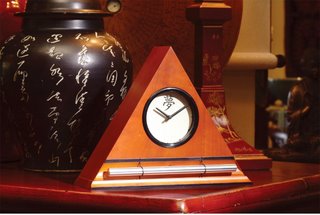 gentle, soothing zen alarm clock How would you feel about waking every day to a siren sounding in your bedroom? Or how about the crashing of cymbals right next to your head? This is the stuff of nightmares. Yet it is not that far removed from most folks’ actual morning experience.
Take alarm clocks. Please. Their very name indicates their primary quality. They frighten, startle, warn, or shock us into wakefulness. And they take several forms. I once had an old-fashioned alarm clock, the kind with two brass bells and a hammer that struck both bells with infuriating speed, creating a metallic cacophony that could wake the dead. There are electric alarms that buzz with ever-increasing loudness. There are radio alarms that blare out early morning news, commercials, or random music. And on and on.
The alarm clock is a form of violence. It jars us at the time when we are most vulnerable and helpless. Sometimes we respond in kind. My childhood friend, Guy, had a collection of guns. When his clanging alarm clock went off one morning, he threw it out the window and shot it with his rifle.
We in the West have been shocking ourselves into wakefulness for a long time. It has not always been like this, however. For thousands of years people have paid more attention to how they awaken and are awakened.
In many cultures, it is believed that the soul travels when we are asleep. Thus, it is very important that the sleeper is brought gently to wakefulness so that his or her soul might find its way back. For traditional peoples around the world, this is a matter of life and death.
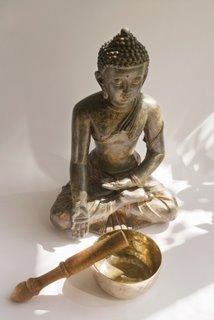 Carved Wooden Thai Buddha with Singing Bowl The Havasupai of the American southwest felt that there was a delicate thread between the night-traveling soul and the body of the dreamer and that any sudden awakening might cut the thread and prevent the soul from returning to the body. The Xingu people of central Brazil similarly aver that sudden waking prevents the soul from returning to the body. In Africa, the Azande and Masai peoples both caution against waking a person suddenly–an aggressive awakening may lead to death. In Japan, too, the Ainu call for waking people slowly to allow the soul and body to reunite, as do the Bororo Indians of Brazil, the Toradja of Sulawesi in Indonesia, and the Andaman Islanders of the Pacific.
Since the method of awakening is so important, many cultures have developed etiquette around it. The Maori of New Zealand consider it a breach of manners to awaken a guest. If, however, it becomes necessary, the host will begin in soft, low tones and increase gradually in volume until the visitor is awake. This gives the spirit time to return to the body. The Kol people of central India and Murngin people Australia follow a similar waking routine.
Of course, we know that people awaken suddenly every day and do not die. But to dismiss the experiences of innumerable other civilizations out of hand would be to miss the point. It is clear that something gets lost when we are awakened sharply and suddenly. It is our dream consciousness that loses its way back to the waking state.
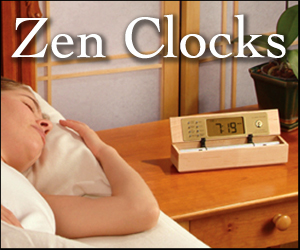 zen alarm clock for a gentle awakening It seems that only in the West do people have difficulty recalling their dreams. Only in the West is there such a thick wall between our dream consciousness and waking consciousness. Part of this is due to the way we, unlike other cultures, undervalue the importance of dream consciousness other than in the psychotherapeutic context. The other reason is that the alarm shocks us out of the dream state and into our rational minds. Our dreams simply don’t have a chance to catch up.
There are, of course, historical reasons for this morning dream death. There is a context to the alarm clock.When the steel and textile mills of the early Industrial Revolution drew in the farmers of the countryside, the clock was the ruler. Time was money. No longer was work driven by the seasons. Instead it was divided into measurable units of time, and the clock became the final arbiter. It was the factory whistle, not the rising of the sun, which moved the people to work. And the alarm clock replaced the rooster.
Our lives today are still dictated by the clock. We don’t even think about it. Train and plane schedules, television and movie programs, restaurant reservations, school, doctor and dentist appointments are all clock-driven.
But what about dream time—that delicate different reality? Dream consciousness is a shy consciousness. It won’t stand being shaken or abused. It simply vanishes.
Alarms are connected with danger and for good reason. They are used in all kinds of disaster situations: burglary, fire, air raid. In their small but significant way, alarm clocks may well have contributed their part to our culture of fear.
Waking Me Softly
There are, however, small islands of hope. Natural and gentle ways of awakening are available and gaining popularity. Intention is the most important ingredient in waking up peacefully. The less we want to get up, the more difficult it will be. But clanging sirens are not the answer. Below are some less alarming possibilities.
Chime Clocks: These quiet, old-fashioned clocks move the sleeper into wakefulness with a softer sound than an alarm buzzer.
Zen Clocks: Gentle Tibetan bell-like chimes strike once, then again 3-1/2 minutes later. The chimes become more frequent over 10 minutes, eventually striking every 5 seconds until you shut it off. They also come in a digital style and in a brass-bowl version with a series of subtle gongs.
 soothing zen alarm clocks by Now & Zen, Inc. Good Morning, Sunshine: Studies by the National Institutes of Health show that waking to light can help people with Seasonal Affective Disorder, certain forms of depression, and sleep disorders. This clock has a built-in light that fades in from zero to full intensity over selected time intervals.
Kids and Pets: For those of us fortunate to have young children or pets in the household, there is a ready-made wake-up service. The hugs of a toddler or nuzzling of a dog are preferable to electronic buzzing. Starting around age three, you might even enlist the child in the service of waking you. You can tell her to shake you gently or speak to you softly or even just to stand there looking at you. If you approach it as a game, the kids are in.
Morning Sounds: In the city or the country, the sounds of the morning world are those that you can anticipate and can help you to awaken softly. Consciously tune in to these. In the country, the birds are the first to welcome the day. And of course, if you live near a rooster, you have a built-in waker-upper. If you live in the city, the sounds of morning are legion—cars and buses rev up, neighbors slam doors, or someone upstairs starts the shower. Learn what these morning sounds are. Select those that are regular and expect them. These are the ones that can serve you daily.
Your Stereo: Most stereo systems can act as timers. Use the CD changer and pick a piece of music that is soothing. Picking a frantic percussion riff or heavy metal cut definitely defeats the purpose. Set the system for the time you want to wake up. Radios aren’t so great for this. We have no idea what’s going to be played. And waking to talk is disconcerting.
 use your inner alarm clock Your Inner Clock: Most of us are so conditioned to the clock that we don’t even need alarm clocks to wake up at a specific time. Here’s how to wean yourself from reliance on the clock.
- Tell yourself that you will wake up before the alarm. You can set your clock, but at bedtime, instruct yourself to wake up before it goes off.
- On a non-working day, try waking without an alarm at all. Just tell yourself that you are going to wake up at a certain time.
- Alternate days. Use an alarm clock every other day. Use your own inner alarm on the other day.
- Keep a record of how you feel on the alarm clock days vs. non-alarm clock days. Any connection between the alarm and getting up on the wrong or right side of the bed?
- Compare how well you remember your dreams on the alarm vs. no-alarm days. Is there any difference at all?
There are probably hundreds, if not thousands, of non-alarming ways to awaken. Perhaps we may someday all move gently from that good night into the world of waking consciousness.
Now & Zen Headquarter Store
1638 Pearl St.
Boulder, CO 80302
(800) 779-6383
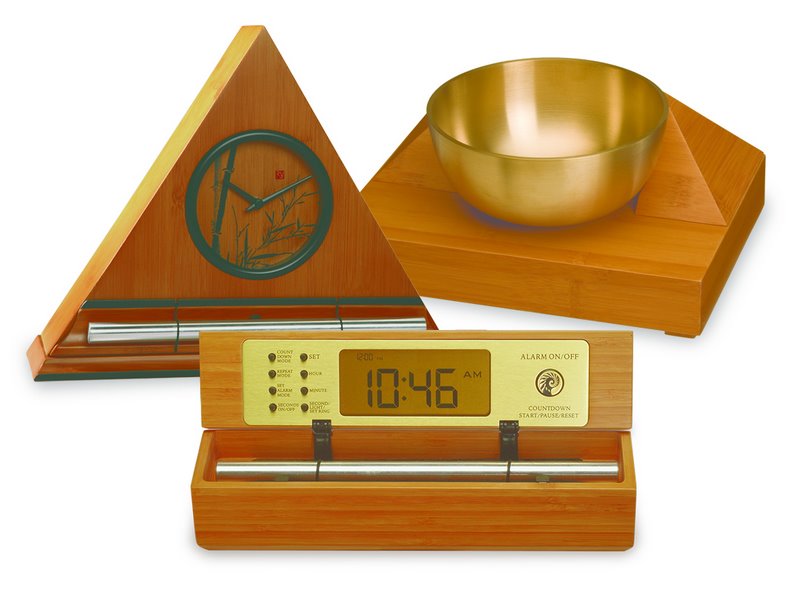 Gentle Alarm Clocks, don't be alarmed!
Posted in Bamboo Chime Clocks, Chime Alarm Clocks, sleep, Sleep Habits
 sleep Studies have found that regular exposure to traffic noise raises blood pressure and may increase the risk of heart disease and stroke, and that nighttime traffic noise interrupts sleep and impairs physical performance in the morning. While you can’t reroute the highway or move to the sticks, you can make a concerted effort to close windows, turn off the TV and the stereo, put on a fan or other white noise machine, and create as much serenity in your bedroom as possible before you go to bed. If there’s no way to block out the sounds of cars whizzing by, consider using earplugs.
adapted from wholeliving.com, Oct. 2011
One of the ultimate Zen like experiences is waking-up from a great slumber refreshed and energized. Your mind and body are harmoniously one, both alert and focused. Having a refreshed mind and body are two keys to a natural and Zen lifestyle. Waking up in the morning should not be a loud and abrupt awakening, but rather it should be a peaceful positive experience. The right natural alarm clock can transition your deep and tranquil sleep into a serene start to consciousness. Imagine a long-resonating Tibetan bell-like chime waking you up to a beautiful morning experience.
The right alarm clock can be the most beneficial investment for you. With our Now & Zen natural alarm clock you are awakened more gradually and thus more naturally. Now & Zen is focused on creating a naturalistic lifestyle, and our clocks are an example of our philosophy.
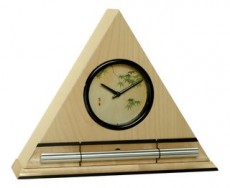 zen alarm clock Now & Zen – The Gradual Alarm Clock Store
1638 Pearl Street
Boulder, CO 80302
(800) 779-6383
Posted in sleep, Sleep Habits
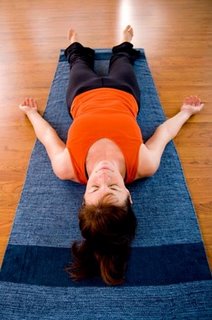 yoga A Simple System of Relaxation
1. Lie down in the corpse pose and make yourself comfortable. Try a pillow under the head, and don’t forget a light blanket to keep drafts from drawing your attention outward.
2. Give yourself a few moments to settle, and allow your body to soften into the support of the ground. Watch the breath until it and your heart rate are steady.
3. Bring your awareness to each point listed below and allow the surrounding muscle tissues to relax.
Crown of the head
Forehead, temples
Eyebrows, eyelids, and eyes
Nose
(Focus on the breath flowing in and out of the nostrils, 2–4 times.)
Cheeks, jaw
Mouth, chin
Hollow of the throat
Sides and back of the neck
Shoulders
Upper arms, lower arms
Hands, fingers
Fingertips
(Inhale as if the breath is flowing down to the fingertips and exhale back up through the nostrils, 2–4 times)
Fingers, hands, arms
Shoulders
Chest and rib cage around the back to the spine
Heart center
(Inhale as if the breath is flowing down to the heart center and exhale back up through the nostrils, 2–4 times)
Abdomen
Sides, lower back
Hips, buttocks
Upper legs, lower legs
Feet
Toes
(Inhale as if the breath is flowing down to the toes and exhale back up through the nostrils, 2–4 times)
4. Reverse the sequence, bringing awareness up the body from the toes to the head without pausing for breath awareness at the toes, heart center, fingertips, or nose.
5. Take 10 breaths while keeping awareness spread throughout the body.
6. Make a gentle transition to your next activity.
adapted from Yoga International, January/February 2006
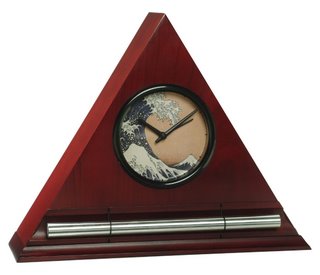 Wellness Tools, clocks and timers for meditation Now & Zen
1638 Pearl Street
Boulder, CO 80302
(800) 779-6383
Posted in Meditation Timers, Meditation Tools, mindfulness practice, sleep
 the link between sleeping and weight Not sleeping enough can do more than make you groggy the next day. It can also take a serious toll on your health—starting with your weight.
In the past several years, medical experts have confirmed a link between lack of sleep and weight problems, and a new study from the University of Chicago and the University of Wisconsin-Madison confirms this. Researchers conducted their study on two groups of overweight people. The first group slept for only five and a half hours each night, and the second group slept for eight and a half hours each night. The study found that while both groups lost weight, those who slept longer burned more fat, while those who slept less burned more muscle mass.
In an interview with NPR, sleep medicine expert Dr. Michael Lacey of the Atlanta Sleep Medicine Clinic explained that lack of sleep not only decreases metabolism, but also interferes with the body’s natural production of the hormones ghrelin and leptin, which regulate appetite and satiation. Too little sleep causes the body to produce too much ghrelin, which makes you feel hungry, and not enough leptin, which makes you feel satiated or full. Staying awake longer than you should will make you feel hungry when you’re really not, and will lead you to eat at times you normally wouldn’t. The longer you stay awake, the more tempted you’ll be to snack, too. To make matters worse, most people staying awake too long reach for high-carb or sugary foods, which they’re unlikely to burn off in the wee hours of the night.
Getting enough sleep will help your body burn fat and regulate weight. But how much is the right amount to get? Most sleep experts pinpoint seven to seven and a half hours as the magic sleep number. Sleep fewer than seven hours and you run the risk of fatigue and weight problems. Sleep too much and you put yourself at risk for cardiovascular disease.
adapted from Natural Home Magazine, October 2010 by Susan Melgren
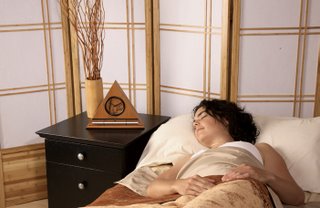 gentle alarm clock, for a slow wake-up
Now & Zen
1638 Pearl Street
Boulder, CO 80302
(800) 779-6383
Posted in Chime Alarm Clocks, sleep, Sleep Habits, wake up alarm clock, Well-being, Zen Alarm Clock
 Take back your time Based in Seattle, the Take Back Your Time (TBYT) organization advocates an examination of America’s time deficit. Developed four years ago as an initiative of The Simplicity Forum (an alliance committed to achieving simple, sustainable ways of life), the group encourages people to consider their time as significant, to spend it well, and to take a stand against institutional forms of time deprivation.
As part of the initiative, the organization designated October 24 as the annual Take Back Your Time Day to bring large-scale attention to the time famine. The event helps participants in the United States, Canada, and Europe address their stress with various ideas for enjoying life — rather than rushing through it. TBYT invites you to celebrate on October 24 in the following ways.
Sleep late
Cancel something
Celebrate your spiritual tradition
Ask an older person about his or her life
Set aside one night a week for a family dinner
Enjoy some poetry
Listen carefully to children’s ideas
Reflect on the balance of labor, leisure, and consumption in your life
adapted from Body + Soul, October 2006 by Jodie Jordan
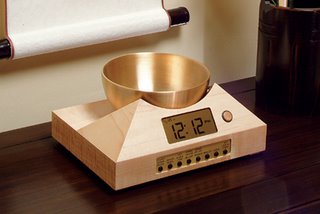 Bowl Gong Timer and Alarm Clock for a Gentle Wake UP Now & Zen
1638 Pearl Street
Boulder, CO 80302
(800) 779-6383
Posted in intention, sleep, Truth, wake up alarm clock
 the sleep and pain connection Waking up in the idle of the night can be a pain — literally. New research from John’s Hopkins University shows that prolonged sleep disturbances may contribute to chronic pain, most likely by hindering the body’s natural pain-control functions. The study followed 32 healthy women for a week: For three nights, one group of participants was woken up every hour for eight hours, while the rest slept undisturbed. On the following days, women in the disrupted-sleep group experienced an increase in spontaneous pain.
If you do wake up during the night, help yourself swiftly return to dreamland by breathing deeply and counting each breath. “And don’t try to recover by consuming a lot of caffeine the next day,” urges sleep specialist and neurologist Dr. Sarah Zallek. “That’s just going to make you more likely to have another bad night of sleep.”
adapted from Body + Soul 2007
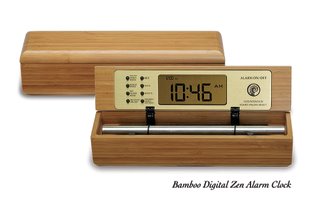 Bamboo Digital Wake Up Clock Now & Zen’s Alarm Clock Store
1638 Pearl Street
Boulder, CO 80302
(800) 779-6383
Posted in Insomnia, Natural Awakening, Now & Zen Alarm Clocks, sleep, wake up alarm clock, Well-being
 Brew Sleep-inducing Tea for a Good Nights Rest For occasional insomnia, the following herbs and supplements (found at natural-food stores) may be especially effective. Be sure to discuss supplements you’re interested in with your health-care practicer.
Sleep-Inducing Tea
For a relaxing bedtime beverage, Yance suggests combining several herbs as follows: Passionflower and skullcap soothe agitated nervous systems and can help with mental chatter; oat seed strengthens the nervous system and helps people who are too tired to sleep; and chamomile provides a gently relaxing base.
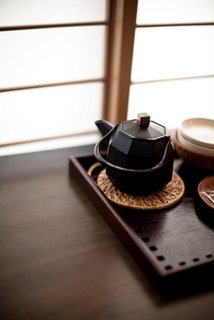 Brew tea to help you sleep
1 chamomile tea bag
30 to 60 drops passionflower tincture
15 to 30 drops skullcap tincture
15 to 30 drops milky oat seed (Avena sativa) tincture
Set your Zen Timer with Chime for 5 minutes. Pour boiling water over tea bag and let steep for five minutes. Remove tea bag, and add drops of tincture to tea. Stir in a touch of honey if desired. Sip and enjoy.
adapted from Body + Soul Magazine, May 2008 by Sarah Schmelling
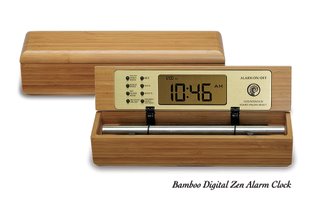 Chime Timers in Bamboo with Natural Acoustic Chimes for Brewing Tea
Now & Zen
1638 Pearl Street
Boulder, CO 80302
(800) 779-6383
Posted in Insomnia, sleep, Sleep Habits
 Set your Zen Alarm Clock at Night Today, in our too-fast, information-overloaded society, we’ve lost much of our connection to the Earth, to spirit, to nature’s cycles, to our own cycles. And yet, we still need things to feed us, to ground us, to give us courage and connection.
Good rituals are essential to our emotional, psychological, and spiritual health. To help reconnect us to the sacred aspects of our lives, we asked an expert to share everyday rituals that they’ve created or practice.
Sleep Practice
Bedtime is when we drop our defenses and become vulnerable. This is why most religions have a tradition of bedtime prayers, says Alexander. Today, she believes, most insomnia and disturbed nights are caused by overactive minds mulling over the day’s problems.
 chime alarm clock for a peaceful sleep
Intention
To mark the break from day to night and ease into a state of physical and mental relaxation.
Materials
Lavender oil, notebook, and writing utensil.
Steps
1. Change (or bathe) with intention. As you take off your clothes, visualize all your daytime anxieties and concerns dropping away. As you wash, imagine that you cleanse away all the negativity of the day.
2. Write down all the positive things that happened during your day.
3. Dab the Lavender oil on a handkerchief and place it near the bed. Lie down, breathe in the soothing scent of the oil, and cast your mind back over the day without judgment.
4. Set your Zen Alarm Clock to the time you need to wake up in the morning right before you go to bed. Use your Zen alarm clock to not only wake you up gradually in the morning, but as a blocker of all negativity. When your alarm clock is set, don’t think about your problems or agenda for tomorrow; instead concentrate on your breathing so you fall asleep peacefully.
Now & Zen Alarm Clocks has adapted this from Body + Soul Magazine
 Chime Alarm Clock For a Progressive Awakening Now & Zen
1638 Pearl Street
Boulder, CO 80302
(800) 779-6383
Posted in Chime Alarm Clocks, intention, mindfulness practice, Now & Zen Alarm Clocks, Progressive Awakening, sleep, Sleep Habits, wake up alarm clock, Well-being
 Kofukuji Temple, Nara Yokoi Outdoor rooms, porches, and pavilions let you come home again to the natural world. Let nature’s elements be your palette and sensory delight your touchstone.
Imagine waking up on a summer morning to a gentle breeze on your face, the chattering of birds, and the scent of flowers opening their petals to the dawn. You lie there, warm under your wool comforter, recalling the bliss of falling asleep with frogs croaking in the nearby pond as you gazed at the stars before closing your eyes. All this, yet indoor plumbing is only a few yards away. This is the joy of outdoor living spaces.
Outdoor rooms, porches, and pavilions are back in style. Tired of being cooped up, people are moving their dining, socializing, sleeping, and sometimes even work spaces outdoors. The success of these spaces depends a lot on understanding some basics about climate and design. If you want your investment in outdoor living to pay off, you’ll want a place that’s comfortable in a range of weather conditions.
Our ancestors, who lived without central heating and cooling, knew a lot about building sleeping porches, gazebos, and summer kitchens. These structures allowed them to escape their hot, stuffy houses in summer. After decades of burning fossil fuels with wild abandon to keep us warm in winter and cool in summer, we’re beginning to realize that these people were on to something. Well-designed outdoor rooms are the epitome of ecological design; they get their heat and light from the sun and their cooling from shade and breezes.
In fact, creating an outdoor space for your home is a great way to increase your grasp of climate-responsive design. It’s an exercise in paying attention to the ecosystems you participate in. By noticing where the prevailing winds come from, and by being aware of the sun’s path across the sky, you can create a garden room that keeps you dry in the rain, unruffled by the wind, cool in summer, and warm in all but the worst of winter without burning a drop of fuel.
Outdoor structures can also expand your home’s living space for much less expense than adding a normal room. And an attached outdoor room can increase your home’s energy efficiency by protecting it from heat, cold, and wind, or even—in the case of a sunspace—by collecting solar heat to be used indoors.
But that’s only the beginning. Outdoor living is also good for your health and well-being. Sunlight, fresh air, and greenery nourish body and soul. The sounds of birds by day and crickets by night, the scent of flowers, the feeling of warm sun and cool breezes on our skin, and the sight of birds, butterflies, and bees nourish our senses and restore our participation in the web of life.
 mother nature's living spaces Try this at home
If you have even a little bit of outdoor space around your home, you can enjoy these delights, too. Start by sitting in different parts of your yard. Notice which areas are sunny, shady, calm, windy, private, exposed, moist, or dry. Notice which spots have nice views, near or far. Think about access: Do you want to walk easily from your indoor kitchen to an outdoor dining room? From a sleeping porch to the bathroom?
When you select a place for an outdoor room, pay attention to how the natural elements interact with this spot, how they vary with the time of day and season, and which elements you’d like to temper for your comfort. Let’s say you want to build a pavilion in a corner of your backyard, but the prevailing wind comes from the northwest—which is exactly the direction of your favorite view. A glass wall on the northwest side will meet both your needs. Or maybe you want to create a warm spot for chilly evenings. You can build a curved stone wall that defines the space, blocks the breeze, and faces south to soak up the sun; build a stone bench against the wall, and you’ll have a toasty spot for relaxing at the day’s end. Overhead shade will make the same spot comfortably cool in summer.
Finally, consider having flexible elements that extend the usefulness of your outdoor space. Add removable glass to a screened porch to turn it into a sunroom in winter. Use heavy curtains in your pavilion to block breezes, rain, or prying eyes. Hang a seasonal cloth roof over a patio, or grow a deciduous vine on a trellis or arbor.
adapted from Natural Home Magazine, July/August 2004
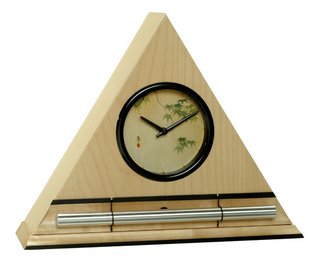 Japanese Maple Leaves Dial Face, Zen Wake-up Alarm Clock Now & Zen
1638 Pearl Street
Boulder, CO 80302
(800) 779-6383
Posted in Cherry Blossoms, Chime Alarm Clocks, Japanese Inspired Zen Clocks, Natural Awakening, Now & Zen Alarm Clocks, sleep, Sleep Habits, Ukiyo-e, wake up alarm clock
 entering silence, starry night in the wilderness How one woman survived three days in the wilderness—alone.
I shivered in the pitch-black night as a steady rain showered my head. I sank deeper into a state of abject loneliness with every miserable drop. My saturated sleeping bag weighed me down as I searched blindly for my flashlight, all the while berating myself for not tying up the tarp before I fell asleep beneath a formerly clear, starry night.
Feeling panicky on the first night of my solo experience in the woods, I imagined the worst—three days of rainy, damp desolation. What am I doing here? I wondered. I could be home, snuggled up with my husband in our cozy bed!
And then it hit me. I realized that this moment was exactly why I had come here—to face my demons head-on, to ride out the fear of being alone in the dark and of being eaten, possibly, by a bear. Isn’t that what a vision quest is all about? Flinging oneself into the wilderness (in this case, a California state park on Labor Day weekend, but still) to test one’s inner strength and hopefully receive some sort of life guidance, perspective, and inspiration?
For the last 10 years, I had contemplated embarking on a quest like this with awe and trepidation. An extrovert by nature, I thrive on the company of others. I can’t be alone in my own house for five minutes without feeling anxious, so how could I endure three entire days by myself? I feared I would go crazy with no one to talk to, engulfed by the deafening silence of nature.
To my surprise, I discovered that nature is extremely loud. Have you ever heard throngs of blue jays chattering overhead at the crack of dawn? I was definitely not alone—from the disturbed gopher under my sleeping bag (was I camped on his house?) to the constant parade of insects, birds, and critters, I was in a forest teaming with life and endless entertainment.
Two days later as I packed my gear, I had a hard time believing the time had passed so quickly. Suddenly the power of facing and overcoming my deepest fears overwhelmed me, and I fell to my knees sobbing. A strength I never knew existed inside me welled up as I realized I could now be alone and unafraid.
I shouldered my backpack, danced a little jig to celebrate my emancipation, and walked out of the wilderness a changed woman.
adapted from Natural Solutions Magazine, Sept. 2009 by Laura Gates
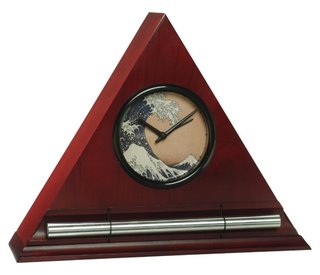 Zen Alarm Clock, a natural chime sound alarm clock
Now & Zen
1638 Pearl Street
Boulder, CO 80302
(800) 779-6383
Posted in Bamboo Chime Clocks, Chime Alarm Clocks, Hokusai Wave, intention, Natural Awakening, Now & Zen Alarm Clocks, Progressive Awakening, sleep, Well-being
« Previous Page
Next Entries »
|
|
|
|